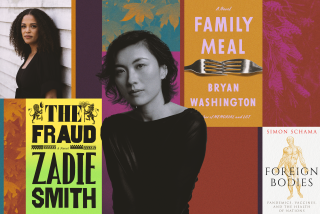The Scholars of War
- Share via
Today’s finest biographers of America’s most famous enemies are friends. They live across the street from each other--teaching history at the University of Georgia in Athens. Emory M. Thomas’ “Robert E. Lee,” just published, recasts Lee’s famously dutiful nature as bearing a harsh cost in self-denial. William S. McFeely won the 1982 Pulitzer Prize for his “Grant: A Biography,” which pares back the loutish image of America’s 18th President to reveal a driven intelligence. The historians spoke, during a recent conference call, about their bond as scholars of war.
A.J.: How do you happen to live across the street?
E.T.: It happened because I played a role in bringing Bill to teach here, and my wife and I helped the McFeelys find their place, their apartment.
W.M.: My wife calls it Appomattox Corner. . . . We’ve known each other since 1983. We were both invited to speak at a college in Virginia. It was a very conservative, very Southern little college where I was viewed as the barbarian biographer of a barbarian Yankee general.
****
A.J.: What do you have in common and what separates you in your approaches to the war?
W.M.: One thing we have in common is that the more we study war, the more heinous war becomes. Too many people assume that we must be war lovers. We’re not. We believe we should look at it. It has been central to the human condition for too damn long.
E.T.: I had a hard time getting the war started because of this antipathy. . . . I think some of the boldest stuff I have in there is Lee’s manipulating [Jefferson] Davis on how to win. I was disgusted with what usually passes for military history. I said to myself, “There’s got to be more to this than just counting the mules in the Fourth Alabama Regiment.”
W.M.: I think my problem with you, Emory, in writing about Lee . . . is that Lee is actually fighting for a very bad cause. The society he’s trying to preserve is based on slavery.
E.T.: I’d say a plague on both their houses. Lee had to be defeated. Slavery had to end. . . . But the thing is so difficult on both sides. At first the North was fighting for the Union, but that was an abstraction and . . . more was required--and that became slavery.
****
A.J.: I sense that you are less directly judgmental than Bill. You were born in the South and he’s from the North. Does this foster a difference in views?
E.T.: Southerners have dealt with burdens of guilt and frustration, poverty, defeat and occupation. I have a natural empathy with that.
****
A.J.: There are events you come at from different angles. One is at the end of the Second Battle of Cold Harbor, that exchange where Lee insists that Grant display a certain truce flag . . . in order to retrieve his wounded. And Grant refuses for, what, three days?
W.M.: I was tougher on both of them than Emory was. . . . Here it’s June. It’s hot. The sun is coming down, and guys are screaming in agony and other guys are digging trenches out to them to try to bring them in, and the two damn generals won’t admit, either of them, that they haven’t won. . . . By the time they got out there, there were only two who had lived.
E.T.: It was not one of Lee’s finest hours.
W.M.: Grant got his revenge at Appomattox.
****
A.J.: You mean when Grant made Lee wait . . . that was come-back for Second Cold Harbor?
W.M.: Yes, I think so. . . . And it is writing about scenes like that which has made us as opposed to war as we are. We really hate it.
E.T.: The older I get, the sicker it seems to glorify it.
More to Read
Sign up for our Book Club newsletter
Get the latest news, events and more from the Los Angeles Times Book Club, and help us get L.A. reading and talking.
You may occasionally receive promotional content from the Los Angeles Times.







